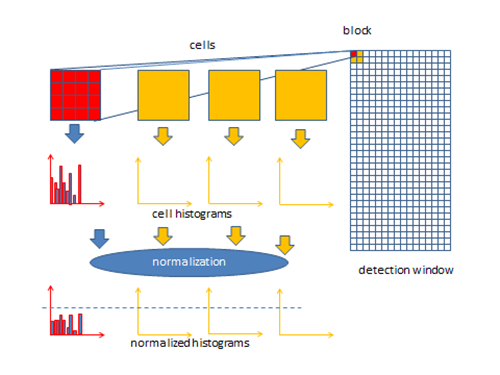When I started doing the research for this project I was to a degree thinking of the terms ‘detection and ‘tracking’ in an interchangeable way that was not helpful in developing the program we are going to need fulfill the brief.
This was drawn into sharp focus when I was exploring HOG (Histogram of Oriented Gradients) and SVM (Support Vector Machine) as a possible combined approach to the project.

Image courtesy of software.intel.com
A Histogram of Oriented Gradients (HOG) is a feature descriptor that works by counting the occurences of a gradient orientation within an image (detection). As gradients tend to represent a sharp change in intensity value there is a high likelihood that a gradient could be an edge. HOG trys to #
|
1 2 |
#Histogram of Oriented Gradients hog = cv2.HOGDescriptor() |
There is also a an SVM Training function
|
1 2 |
# Support Vector Machine SVM = cv2.SVM.train |
REFERENCES:
HOG Descriptor Struct Reference (accessed 31.10.2018)
https://docs.opencv.org/3.4.1/d5/d33/structcv_1_1HOGDescriptor.html#details
Histogram of Oriented Gradients (HOG) Descriptor (accessed 31.10.2018)
https://software.intel.com/en-us/ipp-dev-reference-histogram-of-oriented-gradients-hog-descriptor
Dalal N. Triggs B. Histograms of oriented gradients for human detection. 2005 IEEE Computer Society Conference on Computer Vision and Pattern Recognition (CVPR’05).
https://ieeexplore.ieee.org/stamp/stamp.jsp?tp=&arnumber=1467360
Juliano E. C. Cruza, Elcio H. Shiguemorib, Lamartine N. F. Guimaraes. A comparison of Haar-like, LBP and HOG approaches to concrete and asphalt
runway detection in high resolution imagery
http://epacis.net/jcis/PDF_JCIS/JCIS11-art.0101.pdf
Histograms of Oriented Gradients (accessed October 31st 2018)
https://www2.cs.duke.edu/courses/fall17/compsci527/notes/hog.pdf
